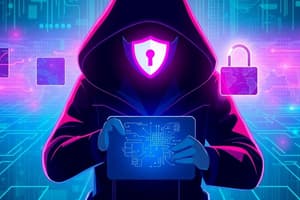Podcast
Questions and Answers
What is one responsibility organizations have regarding personal data under the Data Privacy Act of 2012?
What is one responsibility organizations have regarding personal data under the Data Privacy Act of 2012?
- They can store personal data indefinitely without any measures.
- They can freely share personal data with third parties without consent.
- They must ensure strong security measures against unauthorized access. (correct)
- They are not required to inform individuals about data breaches.
Which of the following actions are organizations required to take regarding personal data breaches?
Which of the following actions are organizations required to take regarding personal data breaches?
- Maintain the status quo until the breach is investigated.
- Notify the affected individuals promptly. (correct)
- Delete all personal data after a breach.
- Neglect to inform any stakeholders involved.
Under the Data Privacy Act of 2012, which of these practices is NOT recommended?
Under the Data Privacy Act of 2012, which of these practices is NOT recommended?
- Using two-factor authentication for sensitive accounts.
- Regularly updating passwords to maintain security.
- Ignoring security warnings from your email provider. (correct)
- Storing personal information on secure websites.
What is a potential consequence of not following data protection measures?
What is a potential consequence of not following data protection measures?
Which statement is true regarding personal data sharing online?
Which statement is true regarding personal data sharing online?
Which Philippine law specifically addresses the prevention of cybercrimes, including offenses such as identity theft, hacking, and online fraud?
Which Philippine law specifically addresses the prevention of cybercrimes, including offenses such as identity theft, hacking, and online fraud?
Under the Data Privacy Act of 2012 (RA 10173), which of the following is a recommended practice for protecting personal information online?
Under the Data Privacy Act of 2012 (RA 10173), which of the following is a recommended practice for protecting personal information online?
Which law mandates the regulation of online content to protect individuals from cyberbullying, and what is the recommended action if you encounter cyberbullying online?
Which law mandates the regulation of online content to protect individuals from cyberbullying, and what is the recommended action if you encounter cyberbullying online?
According to Philippine laws, which of the following is a safe practice to avoid falling victim to phishing scams?
According to Philippine laws, which of the following is a safe practice to avoid falling victim to phishing scams?
What is a key responsibility of internet users under the Data Privacy Act of 2012 regarding their personal data?
What is a key responsibility of internet users under the Data Privacy Act of 2012 regarding their personal data?
Which of the following actions is encouraged for students to enhance internet safety?
Which of the following actions is encouraged for students to enhance internet safety?
What essential feature should individuals enable on their online accounts to improve security?
What essential feature should individuals enable on their online accounts to improve security?
What is the purpose of the E-Commerce Act of 2000 in relation to internet safety?
What is the purpose of the E-Commerce Act of 2000 in relation to internet safety?
Flashcards are hidden until you start studying
Study Notes
Philippine Cybersecurity Laws
- Republic Act No. 10175: Known as the Cybercrime Prevention Act of 2012; addresses identity theft, hacking, and online fraud.
- Republic Act No. 8792: E-Commerce Act of 2000; regulates electronic commercial transactions.
- Republic Act No. 10173: Data Privacy Act of 2012; focuses on the protection of personal information.
- Republic Act No. 9775: Anti-Child Pornography Act of 2009; protects children from online exploitation.
Data Privacy and Personal Information Protection
- Recommended practice: Regularly update passwords and enable two-factor authentication to safeguard against unauthorized access.
- Avoid using the same password for multiple accounts; this increases vulnerability.
- Do not share personal data over public Wi-Fi networks; risk of interception by malicious actors.
Cyberbullying Regulations
- The Cybercrime Prevention Act of 2012 mandates that individuals report cyberbullying incidents to authorities or platform administrators.
- Ignoring perpetrators or confronting them directly online is not recommended; reporting helps build evidence and address the issue.
Phishing Scam Prevention
- Verify email legitimacy by checking the sender's address and looking for red flags; this reduces the risk of falling victim to phishing.
- Avoid clicking on links from unknown sources or responding to requests for personal information; these can compromise security.
Personal Data Protection Obligations
- Organizations are required to secure personal data from unauthorized access; failure to do so can lead to substantial risks.
- Individuals must be informed of any data breaches affecting their personal information, ensuring transparency and accountability.
Encouraging Secure Online Behaviors
- Being knowledgeable about laws and best practices helps students adopt safe online habits.
- Understanding the importance of data protection promotes a culture of responsibility in the digital space.
Studying That Suits You
Use AI to generate personalized quizzes and flashcards to suit your learning preferences.




